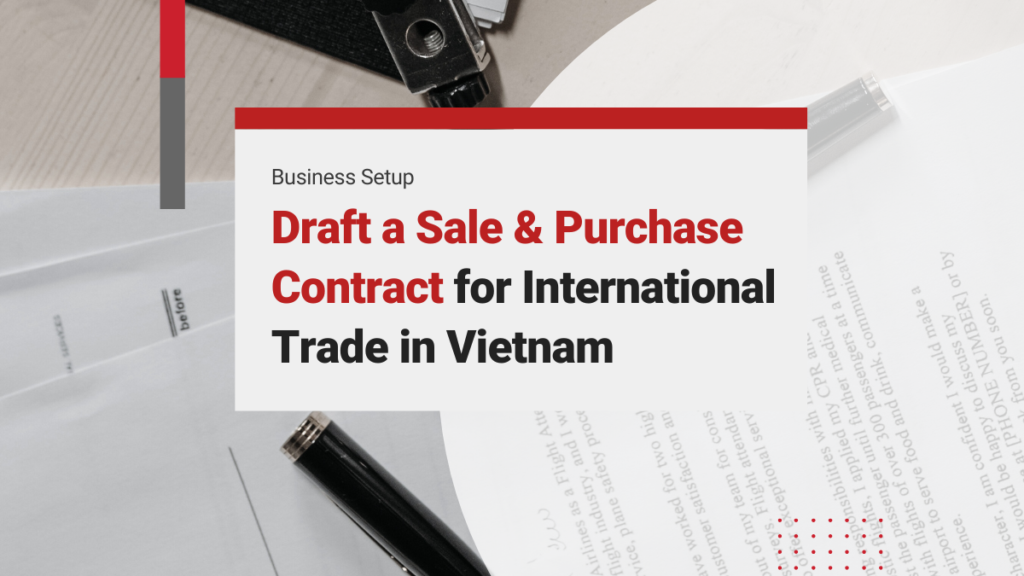When sealing international business deals, few markets shine as brightly as Vietnam. In recent years, this Southeast Asian powerhouse has transformed from a regional player into a global trade dynamo, attracting businesses worldwide seeking new opportunities. Whether you are looking to source manufacturing, expand exports, or forge new trading partnerships, understanding how to craft effective sales contracts in Vietnam has become essential for success. This rise is no accident – Vietnam’s emergence comes at a pivotal time, as global companies diversify their operations beyond traditional manufacturing hubs, spurred by factors like the US-China trade war and rising costs elsewhere.
The country’s recipe for success combines several key ingredients: a government committed to international integration, business-friendly reforms, competitive costs, a young and dynamic workforce, expanding free trade networks, and rapid technological adoption. While the opportunities are abundant, navigating the legal landscape requires careful attention – particularly regarding sales contracts, which fall under the purview of the Civil Code 2015 and Commercial Law 2005. This article breaks down the essential elements of creating robust sales contracts in Vietnam, helping you avoid common pitfalls and build lasting business relationships in this vibrant market.
Draft a Legally Compliant Sale and Purchase Contract for International Trade in Vietnam? Check out InCorp Vietnam’s Legal Advisory Services
Definition of an International Sales Contract In Vietnam
An international sales contract is a legally binding agreement between parties from different countries, where the seller commits to transfer ownership of goods and the buyer agrees to pay for them. According to Article 430 of the Civil Code 2015 and the Commercial Law 2005 of Vietnam, such contracts encompass not only the basic transfer of ownership and payment obligations but also additional responsibilities related to transportation, insurance, and customs procedures.
The contract must identify four essential elements: the parties involved in the transaction, the goods or services being sold, the terms and conditions of the sale, and the price to be paid. While these contracts can technically be formed verbally or through exchanged documents like purchase orders, written agreements are strongly recommended, particularly given that certain transactions legally require written documentation for tax administration, customs procedures, and protection of parties’ interests.
International sales contracts are generally governed by the United Nations Convention on Contracts for the International Sale of Goods (CISG), along with applicable national laws of the parties involved.
The Importance of a Sales Contract in Vietnam for International Trade
A sales and purchase contract is a fundamental document in international trade that establishes rights, obligations, and risk allocation between contracting parties. Under Vietnamese Commerce Law 2005, international sales and purchase activities can only be conducted through specific channels: import, export, re-export with temporary import, re-import with temporary export, and border transfer. The contract serves as a legally binding instrument that not only outlines the parties’ rights and benefits but also clearly defines their respective obligations.
For any international trade transaction, particularly those involving foreign entities, it is imperative that all parties draft contracts that comply with both national laws and relevant international treaties. The contracting parties in an international sales transaction can be either legal entities or individuals. While these parties must adhere to the laws of their respective countries of origin, they are not bound by the laws governing the agreement itself. However, the contract’s validity is contingent upon clear documentation of each party’s nationality status and legal position within the agreement – failure to provide this information renders the contract void.
Read More: Your Simple Guide to Customs Procedures for Vietnam Import & Export
Legal Framework for a Sales Contract in Vietnam: Key Regulations on Import and Trade
Written documentation is mandatory for all international trade transactions under Article 27 of Vietnam’s Commercial Law 2005. This requirement can be satisfied not only through traditional written contracts but also through various forms of electronic communication. Acceptable formats include telexes, faxes, telegrams, and data messages, as well as any other forms that have received legal recognition. This provision ensures that all international purchases and sales are properly documented through legally acceptable methods of communication.
How to Draft a Sales Contract for Import and International Trade?
Crafting a robust international sales contract with a Vietnamese entity requires meticulous attention to detail and adherence to Vietnamese law. This process involves several key steps:
1. Information Gathering
Before drafting, compile all essential details regarding the transaction:
- Parties Involved: Full legal names, addresses, nationalities, and representative information (if applicable) for both the buyer and seller.
- Products/Services: Detailed descriptions, specifications, quality standards, quantities, and any relevant certifications or licenses.
- Transaction Details: Pricing, payment terms (currency, method, schedule), delivery terms (Incoterms, location, timeline), warranty information, and insurance requirements.
2. Legal Counsel
Engage experienced contract lawyers in Vietnam specializing in international trade. Their expertise is crucial for:
- Compliance: Ensuring the contract adheres to Vietnamese laws, regulations, and any specific industry requirements.
- Risk Mitigation: Identifying potential legal pitfalls and incorporating clauses to protect your interests.
- Negotiation Support: Assisting with negotiations and ensuring favorable terms.
3. Contract Drafting
Based on the gathered information and legal advice, draft the contract, paying close attention to:
- Clarity and Precision: Use unambiguous language, avoiding vague terms and potential misinterpretations.
- Structure and Formatting: Organize the contract logically with clear headings and numbered clauses.
- Key Clauses: Include all necessary provisions as outlined below.
4. Essential Contract Clauses
A comprehensive international sales contract with a Vietnamese party should include the following:
a. Contracting Parties’ Details
- Full legal names and addresses
- Nationalities
- Representative information (if organizations)
b. Articles of the Contract’s Goods or Items
- Type, quality, and quantity of goods
- Delivery method (Incoterms), time, and place(s)
- Warranty terms and conditions
- Delivery agency information (if applicable)
c. Payment Terms
- Payment method (e.g., wire transfer, letter of credit)
- Total contract value (currency)
- Payment schedule and deadlines
- Sanctions for overdue payment (within legal limits, typically not exceeding 8% of the contract value in Vietnam)
d. Other Essential Articles
- Contract validity and term (start and end dates)
- Breach of contract provisions (definitions, remedies)
- Rights and obligations of each party
- Dispute settlement mechanism (e.g., arbitration, mediation, litigation) and chosen location. Consider the enforceability of foreign judgments in Vietnam.
- Applicable law (carefully consider which jurisdiction’s laws will govern the contract). Note: Vietnamese law may be mandatory for certain aspects of the contract.
- Force majeure clause (defining events beyond the parties’ control and their impact on performance).
- Confidentiality clause (protecting sensitive information).
- Intellectual property rights (addressing ownership and usage).
5. Negotiation
Engage in thorough negotiations with the other party to ensure mutual agreement on all terms and conditions. Be prepared to compromise while protecting your core interests.
6. Review and Finalization
Before signing, have the finalized contract reviewed by your legal counsel to ensure it accurately reflects the agreed-upon terms and is legally sound. Make any necessary revisions based on their feedback.
7. Legal Safeguards
Given the complexities of international trade and Vietnamese law, continuous legal support is highly recommended. Consult with import and export lawyers in Vietnam throughout the process to:
- Ensure ongoing compliance with evolving regulations.
- Mitigate potential risks.
- Protect your investments.
8. Special Considerations for Vietnam
- Restricted Goods: Verify that the goods are not on the list of commodities banned or restricted for import/export by either Vietnam or your country.
- Special Goods: Contracts for goods attached to land (buildings, trees) are subject to specific regulations under the Land Law 2013 and the Housing Act 2014.
- Applicable Law and Dispute Resolution: Carefully consider the choice of law and dispute resolution mechanism, ensuring enforceability in Vietnam.
- Contractual Penalties: Be aware of the limitations on contractual penalties under Vietnamese law (typically capped at 8% of the contract value).
9. Contract Content (For Reference Only)
While the above outlines essential clauses, the specific content will depend on the nature of the transaction. The following are common elements:
- Party information (as detailed above)
- Contract validity period
- Detailed goods information (as detailed above)
- Price, payment method, and terms
- Shipment details
- Rights and obligations of parties
- Penalties for breach of contract (within legal limits)
- Additional terms, amendments, or cancellations
- Other legally compliant terms agreed upon by the parties.
International Trade Contract Sample and How InCorp Can Assist in Contract Preparation?
InCorp Vietnam understands that trading risks are inherent in all business ventures, regardless of location, size, sector, or project scope. Our experts, therefore, employ a robust and effective approach to negotiating and drafting contracts for our clients, particularly those engaged in international trade in Vietnam.
We provide not only consistent methodologies but also customized contract solutions and timely identification of all potential legal risks. Over the years, Incorp Vietnam’s legal specialists have negotiated and drafted thousands of international trade agreements in Vietnam, working with clients from around the world.

clients worldwide

professional staff

incorporated entities in 10 years

compliance transactions yearly
Learn the Right Setup for Business
Expansion in the Vietnam
Frequently Asked Questions
How To Draft A Business Contract
- To draft a business contract, clearly outline the terms, responsibilities, and expectations of all parties involved. Use precise language, include key elements like payment terms, timelines, and dispute resolution, and ensure it complies with relevant laws. It's advisable to have a legal professional review it before finalizing.
What are the four types of contracts?
- The four main types of contracts commonly recognized in legal contexts are: 1. **Express Contract** – Clearly stated terms, written or spoken, agreed upon by all parties. 2. **Implied Contract** – Formed by the behavior or circumstances of the parties, not written or spoken explicitly. 3. **Unilateral Contract** – One party makes a promise that the other party accepts through performing a specific action. 4. **Bilateral Contract** – Both parties exchange mutual promises and are bound to fulfill their respective obligations. These types apply generally in contract law, including in Vietnam.
What Is Spa Agreement
- A SPA (Sale and Purchase Agreement) is a legal contract outlining the terms and conditions of a transaction between a buyer and a seller. It details the sale price, payment terms, and obligations of both parties.






